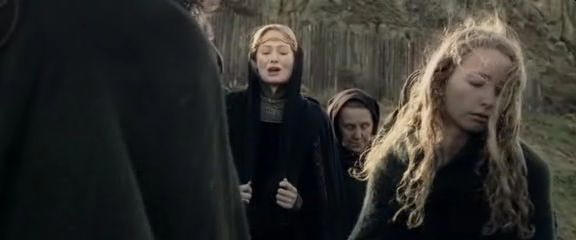
The last part of Beowulf moves, in many ways, from epic to tragedy. As foreshadowed in the Sigemund allusion, Beowulf will finally run into an adversary he can't meet--even though this time, he is in specially prepared armor (compare the Grendel fight, unarmed, and the Grendel's mother fight, with some armor and Hrunting).
The section is anchored (pp. 74-75) by the Lay of the Last Survivor--an elegiac set-piece by the last retainer of the dead king whose hoard the dragon has appropriated. Culturally, the idea of all that treasure not in circulation is a true abomination--that's what gold is for, to be won and shared to reinforce the bonds of cultural loyalty. (Note, for instance, Beowulf's immediate actions when he returns home to Hygelac--he gives him and Hygd the treasures that Hrothgar and Wealtheow have given him, as a sign that he remains Hygelac's loyal thane. They in turn give Beowulf great gifts to mark his emergence as a leader of the Geats. In fact, when Hygelac is killed, Hygd will offer Beowulf the throne rather than see it go to her young son--but Beowulf in true loyalty refuses it, and instead becomes the protector of the boy-king. Only when all of Hygelac's male descendents are dead does he agree to take the throne--and he takes his own position as ring-giver seriously.)
Unfortunately, Beowulf's thanes are not as loyal to him as he was to his own king, and only Wiglaf, the youngest of them, is willing to help his lord fight the dragon. Given the unsettled political situations in Anglo-Saxon England, where retainers often seemed to betray their lords and "Æthelred the Ill-Advised (Unrædig)" was the title of a well-known king, the message at the end of the poem is one of impending disaster. As the grieving Geats burn the funeral pyre holding their great hero, and a woman of the Geats sings a funeral lament (Two Towers fans will recognize Eowyn's lament for Theodred as stemming from this scene), the poet reflects on the impending destruction of the Geatish nation by their enemies the Swedes.

Issues to reflect on:
Individual and society: why is renown so important to these tribes? (And see p.
73, lines 1920 ff, where it is revealed that Beowulf was once thought of as a
slacker.) What value is placed on loyalty, and how should that loyalty be shown?
Why does the Last Survivor feel ashamed?
Women and Men: Why is Hygd compared to Modthryth? Why are the discussions of Freawaru and her betrothal to Ingeld important? Does peace-weaving work?
Rebellion and Authority: Why is it so important for the thief to make peace with his lord (whether that lord is Beowulf or one of his dependent under-kings)? Why are feuds so significant in the Beowulf story?
